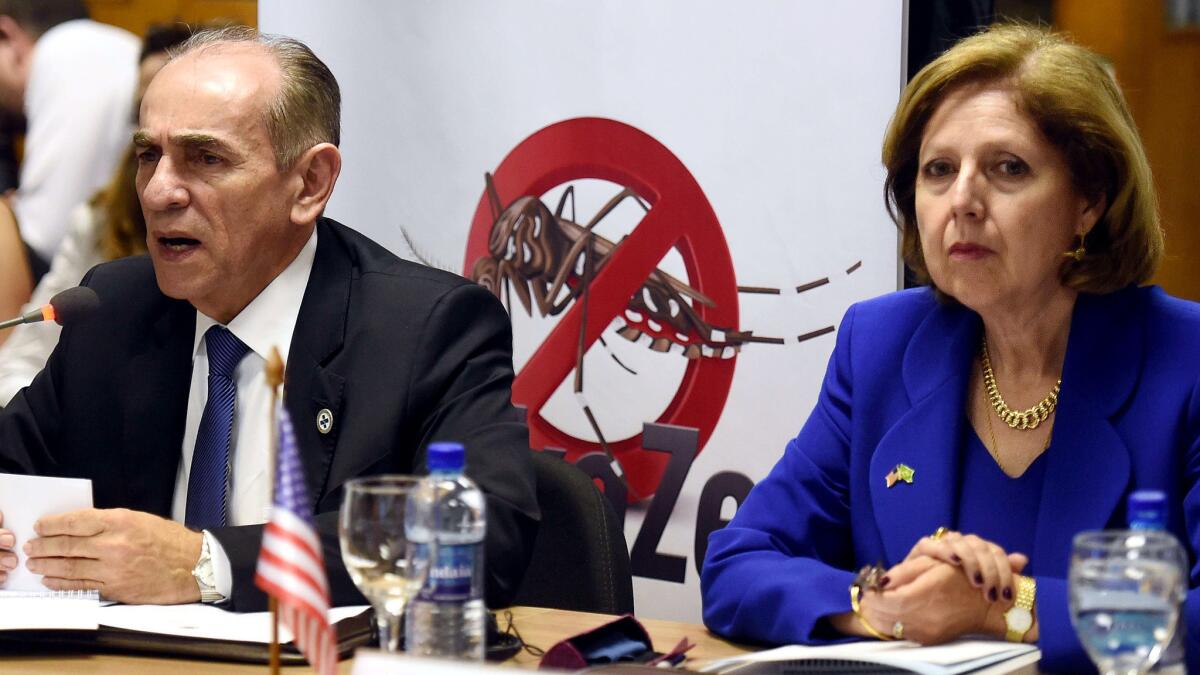Zika virus could add to stress level of Olympians headed to Rio Games this summer

Marcelo Casto, Brazil’s minister of health, and Liliana Ayalde, the U.S. ambassador to Brazil, take part in a conference discussing the Zika virus and the upcoming Olympics on Thursday in Brasilia.
- Share via
The Rio Open normally would be just another tennis tournament, a routine stop on the pro circuit.
The Zika virus has changed all that.
Rio de Janeiro lies at the heart of the Zika outbreak, a mosquito-borne illness that has spread through much of the Americas and may be linked to birth defects and serious complications.
As play began on the clay courts at Jockey Club Brasileiro this week, top-seeded Rafael Nadal told reporters: “I know there is the risk.”
It makes the tournament a test case for the sporting world, a chance to see if athletes are willing to compete in a city where they may face exposure to the virus.
The issue is key to Olympic leaders who have heard rumblings about the 2016 Summer Games in Rio.
Despite repeated assurances from the International Olympic Committee, there has been talk of worried athletes — if not entire national contingents — skipping the Games.
While medical experts say concerns are understandable, they suggest that the situation in Brazil is not as dire as it might seem — and could change significantly before the opening ceremony Aug. 5.
“If we were sending athletes to the Olympics right now, it probably wouldn’t be a good idea,” said Jae Jung, director of USC’s Institute of Emerging Pathogens and Immune Diseases. “Six months down the road is different.”
It was this month that the World Health Organization declared Zika a global public health emergency.
With no vaccine available, 39 countries have reported cases of the virus, according to a recent WHO report. Six nations have seen a concurrent increase in microcephaly and/or Guillain-Barre syndrome, which can cause paralysis.
Researchers have yet to confirm a link between Zika and those illnesses, but there is enough anecdotal evidence to prompt concern.
The WHO has stopped short of issuing a travel ban, suggesting instead that visitors to infected areas take precautions such as using insect repellent and wearing long clothing. Women who are pregnant or planning to become pregnant have been advised to consider delaying travel.
But for most other people, experts say, Zika presents minimal risk.
“It’s a very mild illness,” said Dr. Karin Nielsen, a specialist in pediatric infectious diseases at UCLA. “Fever happens in only about a quarter of the patients.”
That might not comfort Olympic athletes who wear minimal clothing and compete during the day when mosquitoes are most likely to bite.
U.S. soccer goalie Hope Solo recently told Sports Illustrated that she was hesitant about traveling to Brazil this summer. The head of Kenya’s national Olympic committee said he might consider withdrawing his team.
“Obviously, we are not going to risk taking Kenyans there if this Zika virus reaches epidemic levels,” Kipchoge Keino told the Guardian.
The IOC has vowed to monitor the situation and have Olympic venues inspected daily for standing water where mosquitoes might breed. The U.S. Olympic Committee recently announced that it would hire infectious disease specialists to counsel athletes.
In Rio, officials have another concern: the affect on fans and tourists planning to visit next summer.
“That’s the greater risk for them — how many people are concerned enough to not go,” said Stacy Finkbeiner, a University of Michigan microbiologist who focuses on the economic impact of emerging viruses.
Join the conversation on Facebook >>
The Brazilian government has launched a series of initiatives, spraying insecticide and distributing pamphlets that advise the public to be vigilant about places such as buckets, rain gutters and flower pots where water can accumulate.
“They need to be amping that up and employing a number of strategies,” Finkbeiner said.
The changing of seasons might be even more effective in combating Zika, experts say.
Mosquito-borne viruses are nothing new to South America, which has seen repeated outbreaks of dengue and yellow fever. These illnesses have historically subsided during winter.
“When the temperature goes down, the mosquito population decreases,” Jung said. “I think that’s probably the key.”
As the IOC has repeatedly pointed out, the Rio Games will take place in the midst of Brazil’s winter.
“Everyone is afraid like it’s the end of the world,” UCLA’s Nielsen said. “I think there is a lot of misunderstanding about this virus.”
Even this week, with summertime temperatures reaching the low 90s in Rio, some of the world’s best tennis players did not hesitate to enter an ATP tournament.
David Ferrer said he is wearing long pants away from the court but added, “I’m not obsessed about it.”
Nadal displayed a similar attitude, shrugging when asked about Zika.
“I’m not worried about this,” he said. “If it happens, then bad luck.”
Twitter: @LATimesWharton
MORE SPORTS COVERAGE
Clippers trade Lance Stephenson to Memphis for Jeff Green
Manny Pacquiao posts Bible verse that states gay people should be killed
Lakers’ Byron Scott defends his coaching style
More to Read
Go beyond the scoreboard
Get the latest on L.A.'s teams in the daily Sports Report newsletter.
You may occasionally receive promotional content from the Los Angeles Times.







